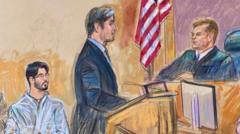In his inaugural homily as pontiff, Pope Leo XIV, the first American pope, resonated with the common people and extended a mission of compassion toward the marginalized. His address underlined a commitment to missionary work and a strong stance against the inequities faced by various communities worldwide.
Pope Leo XIV’s First Homily: Commitment to the Marginalized and Missionary Work

Pope Leo XIV’s First Homily: Commitment to the Marginalized and Missionary Work
In a historic first Mass, Pope Leo XIV embraces ordinary people and calls for outreach to heal societal wounds.
Pope Leo XIV, during his first Mass on May 9, 2025, addressed a gathering of cardinals in the Sistine Chapel, emphasizing the need to champion the cause of "ordinary people" while criticizing the rich and powerful. This powerful message reflects a shift towards inclusivity and outreach in the Catholic Church—a hallmark of his predecessor, Pope Francis.
Hailing from Chicago, Leo, born Robert Francis Prevost, symbolically intertwines his American roots with a life dedicated to serving the poor, particularly in Peru, where he established significant connections. Cardinal Pablo Virgilio Siongco David of the Philippines remarked on the importance of Leo’s history in serving marginalized communities, suggesting that his experience will guide his papacy.
In a ritual that echoed the teachings of his predecessor, Pope Leo called for urgent “missionary outreach” to mend societal divisions. In his homily, he lamented a global decline in faith, attributing it to "appalling violations of human dignity" that plague society. He underscored the Church's role in addressing these grievances, invoking a collaborative spirit in tackling both present and future issues.
Leo, who has held various senior positions within the Vatican, including managing the office overseeing all bishops worldwide, emphasized the necessity for a church that remains close to its congregations. His deep understanding of the global Catholic landscape—garnered from experiences both in the U.S. and Latin America—positions him uniquely to navigate the complexities of contemporary church governance.
Additionally, the pope’s leadership style appears influenced by his background in the Order of St. Augustine, which prioritizes collective decision-making and community service. Experts suggest this approach may lead to a more collaborative governance style that resonates with many who yearn for a more inclusive church.
As Leo continues to take center stage, he faces critical questions about the Church's direction: Will he push for continued reforms initiated by Francis? His first public address hinted at maintaining the synodal approach widely embraced under Francis, signifying a commitment to dialogue within the Church across diverse issues.
The enthusiastic reception he received from the people of Chiclayo, Peru—a place he served for years—reinforces the affection and allegiance felt towards him by local communities. As the world focuses on his papacy, it remains to be seen how Leo XIV will bridge the gap between tradition and evolving contemporary issues. Ultimately, his reign may serve as an inflection point for the Church as it addresses pressing global challenges, from the refugee crisis to social inequality.


















